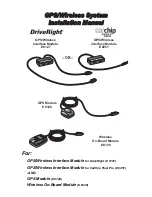
crease in temperature could cause
tread separation, and failure of the
tire(s). Possible resulting loss of
vehicle control could lead to an
accident.
!
Measuring and adjusting air
pressure to achieve proper in-
flation
Check and, if necessary, adjust the
pressure of each tire (including the
spare) at least once a month and
before any long journey. Check the
tire pressures when the tires are
cold. Use a pressure gauge to
adjust the tire pressures to the
specific values. Driving even a
short distance warms up the tires
and increases the tire pressures.
Also, the tire pressures are affected
by the outside temperature. It is
best to check tire pressure out-
doors before driving the vehicle.
When a tire becomes warm, the air
inside it expands, causing the tire
pressure to increase. Be careful not
to mistakenly release air from a
warm tire to reduce its pressure.
&
Glossary of tire terminology
.
Accessory weight
The combined weight (in excess of
those standard items which may be
replaced) of automatic transmis-
sion, power steering, power brakes,
power windows, power seats, radio,
and heater, to the extent that these
items are available as factory-in-
stalled equipment (whether in-
stalled or not).
.
Bead
The part of the tire that is made of
steel wires, wrapped or reinforced
by ply cords and that is shaped to fit
the rim.
.
Bead separation
A breakdown of the bond between
components in the bead.
.
Bias ply tire
A pneumatic tire in which the ply
cords that extend to the beads are
laid at alternate angles substantially
less than 90 degrees to the center-
line of the tread.
.
Carcass
The tire structure, except tread and
sidewall rubber which, when in-
flated, bears the load.
.
Chunking
The breaking away of pieces of the
tread or sidewall.
.
Cold tire pressure
The pressure in a tire that has been
driven less than 1 mile or has been
standing for three hours or more.
.
Cord
The strands forming the plies in the
tire.
.
Cord separation
The parting of cords from adjacent
rubber compounds.
.
Cracking
Any parting within the tread, side-
wall, or inner liner of the tire
extending to cord material.
.
Curb weight
The weight of a motor vehicle with
standard equipment including the
maximum capacity of fuel, oil and
coolant, and if so equipped, air
conditioning and additional weight
optional engine.
Consumer information and Reporting safety defects/Tire information
13-5
–
CONTINUED
–
Summary of Contents for 2014 Forester
Page 1: ...2015 Forester Owner s Manual...
Page 3: ......
Page 4: ...This manual describes the following vehicle types...
Page 5: ......
Page 29: ......
Page 97: ......
Page 320: ...Audio Hands free system 5 61...
Page 321: ......
Page 343: ......
Page 421: ......
Page 443: ......
Page 513: ......
Page 530: ...Index 14...
Page 541: ......
Page 542: ......
Page 543: ......
Page 544: ......
















































